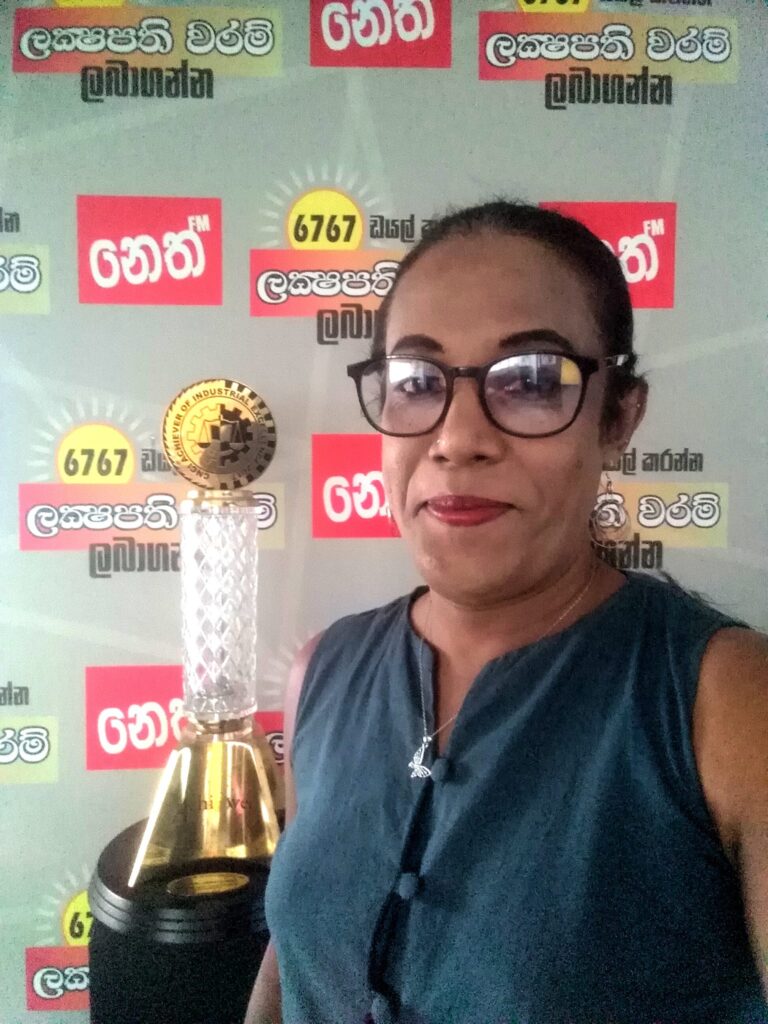By: Isuru Parakrama
October 27, Colombo (LNW): In an inspiring step forward for LGBTQIA+ representation and social acceptance, Chanu Nimesha, Secretary of Women’s Affairs for the Sri Lanka Socialist Party, is making history by becoming the first openly transgender candidate to contest an election in Sri Lanka.
Representing the Kegalle District, Nimesha’s candidacy signals not only her courage and commitment to her political convictions but also a transformative moment for Sri Lankan politics and LGBTQIA+ rights.
In a country where LGBTQIA+ rights are often being overlooked and the transgender community faces widespread social stigma, Nimesha’s political journey reflects a rising demand for inclusivity, social justice, and equality.
“I am thankful to the Sri Lanka Socialist Party for giving me the opportunity to contest the general election,” Nimesha expressed in a public statement, acknowledging her gratitude to the party for championing this landmark representation.
She further added that her candidacy was about creating history, fostering a path of inclusivity, and breaking through long-standing barriers for the LGBTQIA+ community in Sri Lanka.
Her position on the electoral platform has sparked both support and resistance, with opposition from nationalist and transphobic individuals and groups that remain prevalent within the country.
Nimesha’s public presence as an LGBTQIA+ advocate and activist gained momentum during the “Aragalaya” movement in 2022, a year marked by Sri Lanka’s severe economic crisis.
At a time when the country was grappling with immense financial hardship and political unrest, Nimesha’s participation and vocal stand in the protests underscored her commitment to advocating for the oppressed.
“Aragalaya” became a protest movement that embodied the people’s frustrations with the government’s management of the economy, as inflation soared, essentials grew scarce, and civil unrest peaked.
Amidst this turbulent backdrop, Nimesha’s voice amplified the need for systemic change, encompassing the inclusion and recognition of minority rights within the national political agenda.
Historically, Sri Lanka’s LGBTQIA+ community has faced a challenging path, with restrictive laws and social stigmas hindering open expression and access to rights for non-heteronormative individuals.

Despite provisions of legal recognition for people of transgender identities to undergo changes in their documents being already available, many Sri Lankans within the LGBTQIA+ spectrum remain marginalised.
This marginalisation extends into healthcare, education, and the job market, where discrimination is pervasive, leaving individuals vulnerable and often denied their basic rights.
For transgender Sri Lankans, the obstacles are even more pronounced, as society continues to grapple with biases rooted in conservative values, cultural norms, and religious beliefs.
In a nation where the legal landscape does not yet afford protection to LGBTQIA+ people, Nimesha’s candidacy is a bold stance that reflects both a personal and collective struggle for recognition and respect.
Nimesha’s political aspirations are closely aligned with her socialist and leftist values, ideologies that prioritise the welfare of the marginalised and the upliftment of the working class. Her alignment with these ideals resonates strongly with her supporters, who see her as an authentic voice advocating for structural reforms.
As a candidate, Nimesha represents an approach to governance that prioritises equality, rights, and welfare for all. Her focus extends beyond LGBTQIA+ issues, aiming to address the wide array of socio-economic challenges that Sri Lanka’s citizens face.
For many members of the LGBTQIA+ community, Nimesha’s candidacy is an encouraging signal that their voices, too, might find representation within the broader political narrative.
The symbolic power of her candidacy lies in its potential to encourage more individuals from marginalised backgrounds to pursue roles in public service and leadership, thus redefining the political landscape in Sri Lanka.
Whilst efforts have been made over recent years by activists and human rights organisations to address gaps affecting the queer community, legal reforms remain slow, and social prejudices persist.
For transgender people, societal challenges are exacerbated by the lack of resources and institutional support. These obstacles are not limited to the individual, as they also affect transgender individuals’ access to healthcare, job security, and the ability to live with dignity.
The lack of formal legal protection places transgender Sri Lankans at a high risk of experiencing abuse, violence, and workplace discrimination. Despite these adversities, the community’s resilience has grown stronger over time, as more LGBTQIA+ voices and advocates come forward, raising awareness about the injustices faced by the community.

Nimesha’s candidacy could potentially catalyse a shift in how Sri Lankan society perceives transgender individuals, fostering a more inclusive environment where diverse identities are accepted and celebrated.
Aside from her political career, Nimesha is also a self-inked author, whose works often delve into social justice themes and offer insights into her lived experiences as a transgender woman in Sri Lanka.
Her written contributions provide a nuanced perspective on the struggles and aspirations of those within the LGBTQIA+ community and reflect her steadfast commitment to equality.
As a writer, her work has resonated deeply with readers, serving as a source of both education and inspiration for those within the LGBTQIA+ community and beyond.
Nimesha’s candidacy, without argument, beacons hope for the LGBTQIA+ community in Sri Lanka, challenging the pervasive stereotypes and inspiring others to break free from societal constraints.

